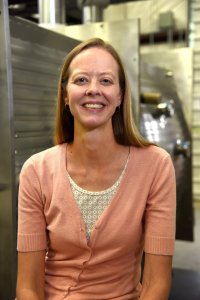Presented By: Aerospace Engineering
Chair's Distinguished Lecture: Accelerating Nuclear Technologies for Space Applications via Terrestrial Microreactor Development Programs

Shannon M. Bragg-Sitton, Ph.D.
Idaho National Laboratory
Lead, Integrated Energy Systems
Abstract:
Advanced nuclear technology is being developed at a rapid rate for terrestrial applications, ranging from megawatt scale microreactors for remote villages and industrial activities to large-scale reactors that could support centralized electricity production in a manner similar to current nuclear power plants. Terrestrial microreactors, which operate at a power level comparable to reactors that might be deployed for nuclear electric propulsion, are on a faster development and demonstration timeline than space nuclear power systems. Development of these systems could provide technology advances and lessons learned relevant to the development of both nuclear electric and nuclear thermal propulsion (NEP and NTP) systems. This seminar will provide a high-level overview of NEP, NTP, and terrestrial microreactor system designs; discuss potential areas of similarity across these systems; and provide a summary of technology and infrastructure development that will support rapid deployment of terrestrial microreactors—and will hopefully accelerate space nuclear system deployment as well.
Bio:
Dr. Shannon Bragg-Sitton is the Idaho National Laboratory Lead for Integrated Energy Systems in the Nuclear Science & Technology Directorate. In this role, Shannon leads research in the innovative application of nuclear energy alongside other clean energy generators, seeking to maximize energy utilization, generator profitability, and grid reliability and resilience through systems integration. She also serves as the co-Director for the INL Laboratory Initiative on Integrated Energy Systems and is the National Technical Director for the DOE Office of Nuclear Energy Integrated Energy Systems program.
Shannon has held multiple leadership roles in DOE Office of Nuclear Energy programs since joining INL in 2010. These roles have included program leadership for space nuclear power and propulsion systems, advanced nuclear fuels, and microreactor development.
Prior to joining INL, Shannon was an Assistant Professor in the Nuclear Engineering Department at Texas A&M University (2007 – 2010) and was a Technical Staff Member at Los Alamos National Laboratory (2004 – 2007), during which time she was on assignment at NASA Marshall Space Flight Center. In each of these capacities, her primary research area was in space nuclear power and propulsion systems.
Shannon frequently serves on national and international committees and has numerous publications. Shannon recently served as a member of the National Academy of Sciences, Engineering, and Medicine ad hoc committee on Space Nuclear Propulsion, which evaluated the primary technical and programmatic challenges, merits, and risks for developing and demonstrating space nuclear propulsion technologies of interest to future exploration missions. The committee report on Space Nuclear Propulsion for Human Mars Exploration was released in February 2021.
Dr. Bragg-Sitton holds a PhD and MS in Nuclear Engineering from the University of Michigan, an MS in Medical Physics from the University of Texas at Houston, and a BS in Nuclear Engineering from Texas A&M University.
Idaho National Laboratory
Lead, Integrated Energy Systems
Abstract:
Advanced nuclear technology is being developed at a rapid rate for terrestrial applications, ranging from megawatt scale microreactors for remote villages and industrial activities to large-scale reactors that could support centralized electricity production in a manner similar to current nuclear power plants. Terrestrial microreactors, which operate at a power level comparable to reactors that might be deployed for nuclear electric propulsion, are on a faster development and demonstration timeline than space nuclear power systems. Development of these systems could provide technology advances and lessons learned relevant to the development of both nuclear electric and nuclear thermal propulsion (NEP and NTP) systems. This seminar will provide a high-level overview of NEP, NTP, and terrestrial microreactor system designs; discuss potential areas of similarity across these systems; and provide a summary of technology and infrastructure development that will support rapid deployment of terrestrial microreactors—and will hopefully accelerate space nuclear system deployment as well.
Bio:
Dr. Shannon Bragg-Sitton is the Idaho National Laboratory Lead for Integrated Energy Systems in the Nuclear Science & Technology Directorate. In this role, Shannon leads research in the innovative application of nuclear energy alongside other clean energy generators, seeking to maximize energy utilization, generator profitability, and grid reliability and resilience through systems integration. She also serves as the co-Director for the INL Laboratory Initiative on Integrated Energy Systems and is the National Technical Director for the DOE Office of Nuclear Energy Integrated Energy Systems program.
Shannon has held multiple leadership roles in DOE Office of Nuclear Energy programs since joining INL in 2010. These roles have included program leadership for space nuclear power and propulsion systems, advanced nuclear fuels, and microreactor development.
Prior to joining INL, Shannon was an Assistant Professor in the Nuclear Engineering Department at Texas A&M University (2007 – 2010) and was a Technical Staff Member at Los Alamos National Laboratory (2004 – 2007), during which time she was on assignment at NASA Marshall Space Flight Center. In each of these capacities, her primary research area was in space nuclear power and propulsion systems.
Shannon frequently serves on national and international committees and has numerous publications. Shannon recently served as a member of the National Academy of Sciences, Engineering, and Medicine ad hoc committee on Space Nuclear Propulsion, which evaluated the primary technical and programmatic challenges, merits, and risks for developing and demonstrating space nuclear propulsion technologies of interest to future exploration missions. The committee report on Space Nuclear Propulsion for Human Mars Exploration was released in February 2021.
Dr. Bragg-Sitton holds a PhD and MS in Nuclear Engineering from the University of Michigan, an MS in Medical Physics from the University of Texas at Houston, and a BS in Nuclear Engineering from Texas A&M University.